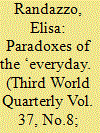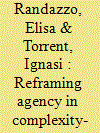| Srl | Item |
| 1 |
ID:
146656


|
|
|
|
|
| Summary/Abstract |
With the advent of the local turn in the mid-2000s, critical approaches have attempted to rethink peace building from the bottom up, placing local agents at the centre of the debate, declaring the end of top-down governance and affirming the fragmented, complex and plural nature of the social milieu. While local turn approaches have become popular in peace-building theory, this article invites the reader to question and problematise the local turn’s use of the concept of ‘everyday’, in order to explore paradoxes and contradictions that indicate the need to think more deeply about the impact of the local turn’s project of critique.
|
|
|
|
|
|
|
|
|
|
|
|
|
|
|
|
| 2 |
ID:
178181


|
|
|
|
|
| Summary/Abstract |
This article examines how the growing complexity of peacebuilding settings is transforming the classic notion of purposeful agency into a non-purposeful, adaptive form of being in such contexts. Through an analysis of critical peacebuilding literature and a reflection on the UN’s peacebuilding practices in the field, the article first argues that complexity has been gradually replacing linear, top-down strategies with approaches seeking to draw attention to interdependencies, relationality and uncertainty. The article then suggests that engaging with complexity has critical implications for the traditional understanding of purposeful agency in the peacebuilding milieu that go beyond those of the governmentality critique, which conceptualizes the complexity turn as a strategy for extending control over post-conflict societies. Complexity is eventually conceived of in the article as a performative contextual quality that stems from the non-linear, co-emergent and unpredictable entanglement of interactions between actors in peacebuilding processes. This state of entanglement hinders the autonomous, purposeful agential condition of these actors in war-torn scenarios – in this article, peacebuilding implementers specifically – in which agency seems more and more restricted to its adaptive nature.
|
|
|
|
|
|
|
|
|
|
|
|
|
|
|
|